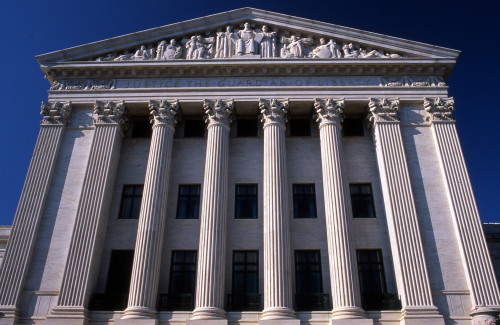This story begins in 2002. Cynthia Simpson, a Wiccan and member of a local Unitarian Universalist congregation in Virginia, approached the Chesterfield County Board of Supervisors to be included in a rotating lineup of local clergy who gave opening prayers/invocations at board meetings. Simpson was rebuffed by the County’s lawyer, saying that due to the “polytheistic, pre-Christian” nature of her faith they could not honor the request. So, starting in 2003, a lawsuit was filed.
“The Chesterfield County Board opens its meetings with an invocation given by invited local clergy whose names are drawn from an official list that the County maintains. Virtually all the clergy who have delivered invocations represent Christian denominations. The County denied our Wiccan plaintiff’s request to be added to the invocation list on the ground that Wicca is “neo-pagan and invokes polytheistic, pre-Christian deities,” and therefore it does not fall within “the Judeo-Christian tradition.” At the time of the denial, several of the county-board members made statements mocking the Wiccan faith. AU and the ACLU filed suit in federal court on December 4, 2002, alleging that disallowing non-Christian clergy from presenting invocations violates the Constitution. In November 2003, the district court held that the exclusion was unconstitutional. The defendants appealed to the U.S. Court of Appeals for the Fourth Circuit, and in 2004 AU and its cooperating attorneys briefed the appeal. Oral argument was held on February 3, 2005. Unfortunately, we drew a very conservative panel (Judges Niemeyer, Wilkinson, and Williams) that, on April 14, 2005, issued a unanimous decision on the defendants’ behalf. The court reasoned that Marsh v. Chambers permits municipalities to limit prayer-givers to the Judeo-Christian tradition. We filed a petition for rehearing on April 26, 2005, but it was denied shortly thereafter. We filed a petition for certiorari on August 8, 2005, but it was denied on October 10, 2005, thereby concluding the case.”
Simpson’s case, and the Darla Wynne case (also a Wiccan), would go on to help advocates of public government prayer craft policies that ensured things stayed in comfortable Judeo-Christian territory so long as the prayers were not sectarian in nature. This “Christian only, so long as you don’t say ‘Jesus'” status quo (or the “Wiccan-proof policy” as I liked to call it) endured until the Supreme Court ruled in the case of Town of Greece v. Galloway.
“In essence the Court ruled that Greece’s prayer program was non-coercive and fully reflective of American historical tradition and the town’s own cultural heritage. If a legislative body employs sectarian prayer to “lend gravity” to its proceedings and does so in a way that is non-threatening, then religious prayer before a governmental meeting does not violate the Establishment Clause.”
While the SCOTUS ruling opens the door for sectarian prayers, it also notes that having a policy of full inclusion is constitutionally vital in such circumstances.
“Justice Kennedy writes the majority opinion for five Justices. He concludes that the prayers are constitutional, because they aren’t overly sectarian or overly coercive. It’s enough that the Town of Greece opened the prayer opportunity up to everyone, and allowed anyone to say anything. It doesn’t matter that the prayers ended up being overwhelmingly Christian in tone and in number — that wasn’t the Town’s fault. And it doesn’t matter that citizens attending these meetings may have felt pressure to pray — they had no solid reason to feel any such pressure.”
So the SCOTUS case that involved a sectarian Wiccan prayer, built on lower court decisions that involved Wiccan prayers, now comes full circle and returns to Chesterfield County.
“The American Civil Liberties Union and Americans United for Separation of Church and State sent county leaders a letter Thursday stating that the county’s policy must be changed to allow any person from any faith to pray before public meetings for the county to comply with the First Amendment. The county will consult with its attorney on that particular point, but County Administrator James J.L. “Jay” Stegmaier acknowledged that another portion of the policy prohibiting prayers specifically praising or opposing one religion appears at odds with the Supreme Court’s new guidance. In a shift from its previous guidance that prayers be generic, Justice Anthony Kennedy wrote in the Supreme Court’s decision that local governments ‘cannot require chaplains to redact the religious content from their message to make it acceptable for the public sphere.'”
You can read the full letter from the ACLU and AU here.
So here is where the rubber hits the road on the Supreme Court’s prayer idealism. The notion that sectarianism within a government context is OK so long as it’s an open sectarianism. Can the court enforce a truly inclusive model, or will it fail on the local level as politicians and Christian activists scramble to find some way of enforcing a Christians-only policy? Will we finally see Cynthia Simpson give a Wiccan prayer in Chesterfield County, and if we do, does that mean that we’ve won a victory? Will inclusion bring acceptance and understanding, or will its symbolism only reverberate within our interconnected communities? Whatever happens, it looks like we might find out.






















